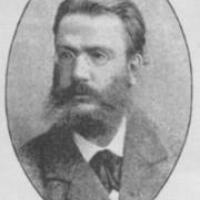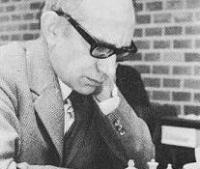
Russia's Chess Teacher
Emanuel Schiffers, Russian chessmaster and chess writer, was born to German parents in St. Petersburg on May 4, 1850 and died there December 12, 1904. He was educated in his native city, studying the classical, physical, and mathematical faculties. In 1871 he became a private tutor.
Schiffers began to play chess when he was about fifteen, and within five years had made such progress that he defeated Tochoumoff and others of equal standing. He continued to advance until he became the leading player in Russia. Schiffers held the title of Russian champion for 10 years before finally being defeated by his student, Mikhail Chigorin in 1880. In 1873 he first played with Chigorin, to whom he then gave the odds of a knight. During the following seven years the pupil came to play a stronger game than his teacher, and in 1880 Schiffers lost the championship of Russia to Chigorin. In 1878 they played on even terms, Schiffers losing the first of two matches 7-3, but winning the second 7.5-6.5, thus establishing himself as the second strongest player in Russia after Chigorin himself. They later played two more matches with Chigorin winning both.
He won matches against Alapin, Chardin, and Mitropolsky. At Rostov on Don in 1896 he played a match against former World Chess Champion Wilhelm Steinitz, losing 6.5–4.5.
Schiffers played eight major foreign tournaments from Frankfurt 1887 to Cologne 1898. His best tournament result was at Hastings 1895 where he finished sixth with 12/21. In 1899 and 1900/01, he took second places, behind Chigorin, in the All Russian Masters Tournaments (1st and 2nd RUS-ch).
Schiffers was known as "Russia's Chess Teacher". In 1889, Schiffers gave the first public lectures on chess theory in Russia, at the St. Petersburg Chess Association and in other cities. He wrote the chess textbook Chess Self-Taught, published 1906.
Emanuel Schiffers was able to play sharp tactical lines that were also part of the classical theme of the Steinitz/Tarrasch era of positional play. He knew how to exploit developmental advantages and/or central control and how to play to his opponent’s weaknesses in an endgame, often creating more weaknesses. This chess teacher from St. Petersburg had a great performance against the elite players of his time!
I wish to add that Schiffers had a special gift to the theory of the discovered attack as you shall see in the next positions. The question could be: "White to play and Black resign?"






